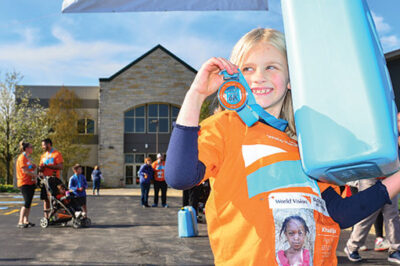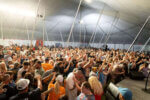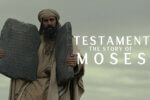One World Vision appeal changed a grieving daughter’s life—and the lives of many others.
Before Crystal O’Rourke’s mother died, she expressed a desire to take O’Rourke and her sisters to a Women of Faith event.
“I went to a church with wonderful ladies who went once a year to Women of Faith,” O’Rourke explains. “And these women, after my mom passed, had made sure that we got to do her dream.”
During the event, O’Rourke held her newborn close as she saw another mother holding a baby—this one on the giant screen before her—and she listened intently about the struggles this stranger faced because of inaccessible clean water.
“I knew that even though my heart would heal eventually … I couldn’t bring my mom back, but, I thought, I can help this mom,” O’Rourke says. The woman she saw represented one of countless mothers in developing countries around the world affected by a lack of clean water.
First Steps
A lack of access to clean water steals precious time from mothers and children who must travel great distances to find any water source. But access to clean water leads to better health, improved nutrition and an ability for children to attend school instead of fetching water. As O’Rourke learned about the global water crisis, compassion gripped her grieving heart and moved her to action.
Taking her first step of many toward global impact, she explains how the Holy Spirit compelled her to become an agent for change. “I immediately went up and started sponsoring a child, who is now 14,” O’Rourke says. “He was 4 at the time.”
From there, she read A Hole in Our Gospel by Richard Stearns, then president of World Vision. She used the information provided at the end of the book to get involved; one of those ways was volunteering through Team World Vision.
Founded in 1950, World Vision is a global Christian humanitarian organization that partners with children, families and their communities to reach their full potential by tackling the causes of poverty and injustice. The nonprofit is the leading nongovernmental provider of clean water in developing countries. Because of World Vision and generous donors, every 60 seconds, a family gets water, and a hungry child is fed. World Vision reaches one new person every 10 seconds and three new schools each day with clean water. In 2019 alone, World Vision connected over 3.4 million children with sponsors and brought clean water to more than 3.4 million people, including children.
Today, O’Rourke, who holds a degree in Christian ministry, is the Global 6K host site coach for World Vision. But before becoming a staff member, she volunteered with the organization for six years. She is grateful for the opportunity to impact communities globally and domestically. “It makes such a difference in both ways,” she says.
When she first got involved, Rusty Funk, Sr. director of church and ministry partnerships invited O’Rourke to host a brand-new, innovative race called the 6K for Water. She considered it an easy enough task: “It’s basically just inviting my friends, my family, my friends from church, and we can all meet at my house.” So she registered for the event, and the group met at her Southern California home to walk to the midpoint—the California Aqueduct—and back.
“And from there,” O’Rourke says, “I just volunteered every year and hosted the 6K, and it grew, more than doubled, each year. It was amazing. We partnered with different churches in the area. It was just great.” In fact, the Global 6K brings positive change to 23 other countries.
Essential Need
The Global 6K for water is a way for everyone, including churches, to end the global water crisis in our lifetimes. On average, a woman in rural Africa walks 6 kilometers—roughly 3.7 miles—to haul 40 pounds of water home, water that is often unclean, World Vision says. “[That water] is filled with disease and bacteria,” O’Rourke says. “And so we like to say that we walk 6K so that they don’t have to.”
As John 10:10 says, Jesus offers us the fullness of life, and World Vision is taking steps—literally and figuratively—to help children, families and communities experience that life by combating the poverty and poor water that often prevent individuals from experiencing it.
Clean water is essential for many reasons: drinking, cooking and cleaning. Because of the COVID-19 pandemic, the importance of proper hygiene and thorough handwashing cannot be stressed enough. Handwashing protects against viruses such as COVID-19, but washing hands with dirty or contaminated water does not adequately protect one’s health. In fact, it can have fatal consequences.
Nearly 1,000 children die daily as a result of diarrhea caused by contaminated water, poor sanitation and improper hygiene, per World Vision’s website. That’s more than those who die for reasons related to AIDS and malaria combined.
According to World Vision, 2.3 billion people live without access to basic sanitation, and 844 million people lack access to clean water. That’s 1 in 10 people on the planet.
Women and children comprise the primary segment of vulnerable individuals who make the weary, and often dangerous, trek to find water. Estimates show that women and girls spend 200 million hours collectively hauling water to their families and communities every day, World Vision says. Some never make it home.
“Clean water is more important than ever because kids don’t have the opportunity to go to school because they have to gather water,” O’Rourke says. “They don’t have the opportunity to do many things that young children should be able to do. And that’s why we hold the Global 6K once a year, so that we can try to bring fullness of life to these children through clean water.”
Water Projects
Because many families in developing countries rely on dirty water for cooking, cleaning and drinking, which can lead to poor health and weakened communities, World Vision aims to end the water crisis in our lifetimes.
To meet this goal, the organization partners with local leaders to determine the best way to make clean water accessible to the community. No community is the same, and one water project that might be successful in an area may not work for another. Communities take ownership of these water projects and are equipped to sustain the systems even after the organization leaves. These innovative solutions “run in harmony with key areas of development: health, education, food and economic development,” the World Vision website says.
The nonprofit utilizes eight primary water projects to make clean water available in communities (The following information comes directly from the teamworldvision.org website):
Drill Rigs: These trucks traverse great distances to drill up to hundreds of feet underground to tap into water aquifers.
Wells: Hand pumps in the middle of a community allow to be generated without electricity.
Solar Pumps: These panels generate energy from the sun to pull water from pumps, up into storage tanks, and then allow gravity to feed water to various communities.
Pipelines: Pipelines transport water from access points and allow for water distribution across hundreds of miles.
Rain Catchments: Roofs and other kinds of catchments collect rainwater into a storage tank for treatment and distribution.
Water Kiosks: From catching rainwater to receiving water from pumps or pipelines, community members come and fill up jugs for a small cost.
Latrines and Handwashing: Sanitation and hygiene are promoted by community leaders and practiced with ventilated, improved latrines and handwashing stations.
Repair Mechanics: Local technicians and members of the water users association are elected to help maintain water projects for long-term sustainability.
Global 6K
The first Global 6K for Water, held in 2014, garnered participation from 1,400 people, and in 2020, over 21,000 participants raised nearly $2 million, changing thousands of lives. Even when you can’t gather in groups, you can make a global impact by hosting a Global 6K for Water. This year the Global 6K for Water will be held May 22, and participants can register through race day.
For individuals who are not ready for contact or feel unsafe in social gatherings, O’Rourke says they do not need to be host site leaders to participate, and they can choose to walk alone.
Host site leaders, which are made up of community leaders, churches and teachers, have the choice to make their host site virtual or to meet in person. “We’re just asking that you follow your community guidelines and the CDC guidelines,” O’Rourke says. “I know we’re in a pandemic, and it might seem a little crazy to host this event right now. But honestly, I think that’s what we need. We need something to bring hope.” She sees the Global 6K as something to look forward to—in an otherwise uncertain time—as a way to change lives, “knowing that you have the opportunity to connect with people, even if it’s from afar and your site is virtual.”
Those who choose to participate in person will likely find the race distanced. There may be different locations where runners can stand. All this is up to the individual host site leader. O’Rourke says some host sites make a big to-do of the event, with huge balloon arches, for example, while others are simple events with snacks and music.
Hosting a 6K in your area is easy. O’Rourke calls the 6K an “out-of-the box event,” meaning World Vision sends everything needed to make the 6K a success, including launch gear and an online web page for each participant to make the most fundraising impact. Though the majority of hosts are churches, O’Rourke says that they also see businesses, schools and individuals host the Global 6K for Water.
Participation requires only four simple steps:
Sign up. Register online to run, walk or roll 6K. Registration is $50 per adult and $25 for anyone under the age of 18. “Both of those types of registrations will actually bring clean water to a person in need thanks to generous donors who fill the gap for us,” O’Rourke says. Every $50 raised brings clean water to one person for life.
Get gear. World Vision will mail a race bib, T-shirt and medal to registrants.
Walk, run or roll on race day. To people who want to make a difference but are intimidated or perhaps not too athletic, O’Rourke says, “Anybody can participate; it just might take some longer than others to complete. But that’s OK. It’s about finishing, right? … If you’ve walked around a theme park for a day, or something like that, you’ve probably walked a 6K before.” This event can become whatever you want it to be, and World Vision encourages creativity and fun. For some, participating in the 6K might
involve a treadmill, food and a good playlist. Others might join a group of friends and walk with a slice of pizza in hand. “It’s like throwing a party with a little bit of exercise,” O’Rourke says. Though the event creates a serious impact for vulnerable communities, the event itself doesn’t have to be so serious.
See change. Celebrate the lives changed from your 6K, including your own.
To those thinking about hosting or participating in a 6K this May, O’Rourke has some advice: “Definitely just do it. I think there’s nothing wrong with taking a step. And you take that leap, and you take that step of faith, and you can change the world.”
Community outreach, family fun and global impact are core values World Vision loves to foster, and the Global 6K is one way churches can engage in all three areas, she says.
The Global 6K functions as a community outreach because pastors report that at the event, they see nearly 80% new faces and names. After the race, these new people often attend the host church and get involved there. In addition to this, pastors also see a significant increase in giving within the church during the month of the 6K. “Seeing the ways that the church is really pouring into the body of Christ outside of its walls empowers their community to really want to give more,” O’Rourke says.
The event is fun for the entire family, and people of all ages and backgrounds run, walk or roll, with the youngest participant 1 year old and the oldest 89, O’Rourke says. She adds, “We see all types of people—obviously, we see those who have disabilities and are in wheelchairs. We see baby bellies and strollers. I actually did my first 6K with my 8-month-old in a backpack carrier, my 3-year-old in a stroller and then my 5-year-old holding mine and my husband’s hand.”
This worldwide event brings together believers across the globe, united for the same cause, to end the clean water crisis and bring hope to developing countries.
To learn more about the Global 6K for Water and how you can make a difference, visit worldvision6k.org/charisma.
Samantha Carpenter is a copy editor for Charisma Media.







Leave a Comment
You must be logged in to post a comment.